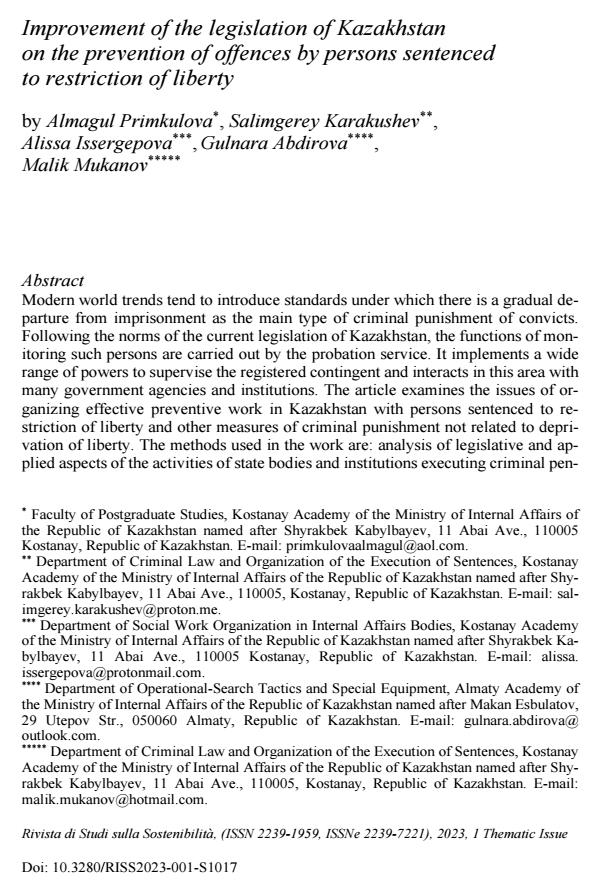Improvement of the legislation of Kazakhstan on the prevention of offences by persons sentenced to restriction of liberty
Titolo Rivista RIVISTA DI STUDI SULLA SOSTENIBILITA'
Autori/Curatori Almagul Primkulova, Salimgerey Karakushev, Alissa Issergepova, Gulnara Abdirova, Malik Mukanov
Anno di pubblicazione 2023 Fascicolo 2023/1 T.
Lingua Inglese Numero pagine 11 P. 267-277 Dimensione file 90 KB
DOI 10.3280/RISS2023-001-S1017
Il DOI è il codice a barre della proprietà intellettuale: per saperne di più
clicca qui
Qui sotto puoi vedere in anteprima la prima pagina di questo articolo.
Se questo articolo ti interessa, lo puoi acquistare (e scaricare in formato pdf) seguendo le facili indicazioni per acquistare il download credit. Acquista Download Credits per scaricare questo Articolo in formato PDF

FrancoAngeli è membro della Publishers International Linking Association, Inc (PILA), associazione indipendente e non profit per facilitare (attraverso i servizi tecnologici implementati da CrossRef.org) l’accesso degli studiosi ai contenuti digitali nelle pubblicazioni professionali e scientifiche.
Modern world trends tend to introduce standards under which there is a gradual departure from imprisonment as the main type of criminal punishment of convicts. Following the norms of the current legislation of Kazakhstan, the functions of mon- itoring such persons are carried out by the probation service. It implements a wide range of powers to supervise the registered contingent and interacts in this area with many government agencies and institutions. The article examines the issues of or- ganizing effective preventive work in Kazakhstan with persons sentenced to re- striction of liberty and other measures of criminal punishment not related to deprivation of liberty. The methods used in the work are: analysis of legislative and ap- plied aspects of the activities of state bodies and institutions executing criminal pen- alties, system-structural (scientific knowledge of intra-industry relations), compara- tive analysis (identification of continuity and specificity of various approaches to the formation of an optimal model of interaction between the subjects of preventive ac- tivities), logical method and method of transition from general concepts to private ones. It was found out that the role of the probation service in preventing new of- fences on the part of convicts is great since in recent years their number has been constantly growing, which indicates insufficient preventive work carried out by in- terested state bodies. One of the reasons for this situation is the imperfection of the legal framework governing their activities. The analysis of the current legislation showed the absence of norms in it that create a unified system for organizing pre- ventive work with the registered contingent for all bodies. With this in mind, pro- posals are being made to improve the norms of the Law of Kazakhstan “On Proba- tion”.
Parole chiave:probation service, registered contingent, humanization, justice, criminal policy.
Almagul Primkulova, Salimgerey Karakushev, Alissa Issergepova, Gulnara Abdirova, Malik Mukanov, Improvement of the legislation of Kazakhstan on the prevention of offences by persons sentenced to restriction of liberty in "RIVISTA DI STUDI SULLA SOSTENIBILITA'" 1 T./2023, pp 267-277, DOI: 10.3280/RISS2023-001-S1017